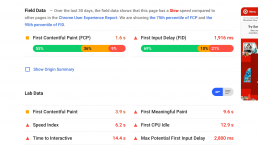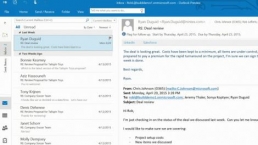As a small business owner, you want to build a website that provides your audience with a great experience and helps you earn more revenue online. If your website is missing essential features, you lose out on potential customers and revenue without even knowing it.
So, what do you need on your site for it to succeed? Here are five small business website essentials you need to know to help your company succeed online.
Let’s dive in!
Feature #1: Critical company information
First on our list of small business website essentials is critical company information. When people visit your website, they’re often looking for important details about your business, so you need to include this information on your site.
So, what type of critical company information should you have on your site?
Location
If people want to visit your small business in person, they need an address to get there. Including this information on your site can help you drive customers to your brick-and-mortar store (if you have one). Include a map on your site, too!
Hours of operation
Let your customers know when your physical location is open if they want to visit you in person. If you have separate customer service hours, make sure you note those, too.
Business description
If someone discovers your business for the first time, they may not know what sets you apart from everyone else. Make sure you include a description of your business on your site — an “about us” section is a great place to put this information.
Contact information
Include contact information, like your phone number and email address, so people can reach out to your small business. You should also have a contact form to provide future clients another way to connect with your company.
Including this information on your small business website will help your audience get all the essential information they need about your organization.
Feature #2: User experience (UX)-focused elements
Next on our list of small business website essentials is UX-focused elements.
The user’s experience on your site is critical because it determines if people stay on your site or return to the search results. You need to build a site that engages users and makes it easy for them to find what they need on your site.
Here are a few UX elements you can add to make your site more enjoyable for your audience:
Simple navigation
Make it easy for your audience to find the information they need with simple and consistent navigation. Use broad headings and categorized subheadings to create organized navigation that’s easy to use and understand.
High-quality multimedia
Multimedia is a critical component of creating an interactive and engaging website. Include multimedia like photos, graphics, and videos to make your site engaging for your audience. These visuals add points of interest and break up the text, too.
Fast load speeds
Users don’t want to wait for information to load on your site. Use a tool like Google PageSpeed Insights to find out how you can improve your website’s load time. You can also invest in page speed services to get help with making your site load faster.
Helpful call to action (CTA) buttons
You need clear, actionable, and noticeable call to action (CTA) buttons to guide visitors to the next step. Design these buttons to stand out on the page while also telling your audience precisely what happens if they click.
Adding these user-friendly elements will help you create a site that’s easy to use and engaging for your audience. It will help you keep leads on your site longer, while will increase leads and revenue for your small business.
Feature #3: Search engine optimized pages
If you’re wondering what to put on a website, the answer is: Whatever it is, make sure it’s search engine optimization (SEO) friendly.
Did you know that only 33% of small-to-midsized (SMBs) have optimized websites? If your site isn’t optimized for SEO, you’re not alone, but it’s time to act!
Users will find your site by searching on search engines like Google — 93% of all online experiences start with a search engine. If your site isn’t optimized for search engines, you won’t drive valuable traffic to your site.
SEO is one of the most critical elements for your small business website because, when used properly, it helps you rank in search results to drive more traffic and revenue for your business.
So, how do you optimize for search engines?
Conduct keyword research
If you want to rank in search results, start by integrating relevant keywords on your site. Conducting keyword research, like with a tool like KeywordsFX, will help you find applicable terms that you can incorporate into your site to rank in search results.
Optimize for long-tail keywords
Long-tail keywords contain three or more words, like “blue insulated water bottle.” These keywords are best because they’re specific, so you know that they’re looking for something relevant to what you offer when people search these terms.
Make your site mobile-friendly
Not everyone will access your site through a desktop. You need to have a responsive website design to ensure that your site adapts to the user’s device. It ensures your site scales to their screens so they can have an enjoyable experience.
Optimize your meta tags
Optimizing your title tag and header tags helps you rank in search results. Google (and users) look at these elements to determine your page’s relevancy. So, by creating an engaging, keyword-driven headline, you can rank better and drive more traffic.
When you optimize your site for search engines, you’ll help more people discover your small business website and learn about what you offer.
Feature #4: Informative content
Next on our list of elements for your small business website is informative content. Content plays a critical role in helping you drive relevant traffic to your site. People want information, and you can provide it.
When you create content, you establish yourself as an authority in your industry. People will see you as a reliable source of information, building trust with these leads. Not to mention, content helps boost traffic and engagement on your site!
Content comes in numerous formats, including:
- Blogs
- Videos
- Infographics
- Ebooks
You can use numerous content formats to help you drive traffic and engage your audience.
Here are some essential things you need to know to create top-notch content:
Write for humans, not search engines
Search engines focus on ranking content that searchers engage with and spend time reading. If you focus on creating content that your audience enjoys and spends time reading, search engines will pick up on this behavior and rank it higher.
Try different content formats
Don’t limit your content to one type. Your audience is diverse, so you want to deliver content in various forms to appeal to your audience’s different members. It will keep your content fresh and exciting for your audience.
Create content often
Frequent content creation creates new avenues for people to discover your business. You want to create content often to drive a steady stream of traffic to your site. Use a content calendar to help you stay on top of content creation and publication!
Informative content will help your small business website rank better in search results so that you can drive more traffic and credible leads to your page.
Feature #5: Trust elements
When someone discovers your small business for the first time, they won’t feel comfortable buying your products or using your services immediately. They want to know that they can trust your business before they buy — that’s where trust elements come in to play.
Trust elements help you establish your reputation and build your leads’ confidence in your business, which is why they’re on this list of small business website essentials.
Here are some trust elements to include on your small business website:
Testimonials
If you have brand lovers that rave about your products, you’ll want to publish those experiences on your site. Testimonials can help you highlight all the positive features of your brand and business so that new customers can get a sense of your company.
Reviews
Reviews are critical because they help shoppers get an unbiased view of your company. You can have positive and negative reviews on platforms like Google, Facebook, and Yelp. Include these reviews on your site to show new visitors what people say about your brand.
User-generated content
User-generated content is a great way to provide insight into how someone enjoys your small business. It enables you to share a first-hand account, with an accompanying visual, so new visitors get a feel for your brand.
Certifications
If you have any industry-specific qualifications, it’s great to include them on your site. If you own a salon, you might have stylists with color certifications. Either way, including this information can help you build trust and confidence with customers.
Trust signals will go a long way in helping you boost revenue for your small business. When visitors trust your brand, they’re more likely to become customers for your company.
We don’t just want to tell you about the beautiful work we do.
WE WANT TO SHOW YOU
We’ve built several Websites in industries like yours
1000
Build your small business website today
Now that you know what to put on a website, you can start optimizing your site to create a better experience for your audience. If your website is missing any of these small business website essentials, it’s time to act!
Tested Technologies has been working with small businesses for over 4 years. We know what your site needs to grow online. In the past two years alone, we’ve driven over ₦2.4 million in sales and over 60,000 leads for our clients.
You can rely on our knowledge and expertise to help you build a website that drives powerful results.
To learn more about improving your website, contact us online or call us today at 08025837481 to speak with a strategist about our web design and development services!
Related Posts
January 3, 2020
5 Lead Generation Website Design Best Practices
July 13, 2015




